![Botolo: Oil exploration to start within two months]()
Oil and gas exploration activities on Lake Malawi will begin in the next two months, the Ministry of Natural Resources, Energy and Mines has said.
[caption id="attachment_89712" align="alignright" width="551"]
![Botolo: Oil exploration to start within two months]()
Botolo: Oil exploration to start within two months[/caption]
Principal Secretary in the Ministry Ben Botolo told
Nyasa Times on Sunday after demands from some concerned residents of Karonga that government should release the full sensor gravity gradiometer on oil and gas exploration on Lake Malawi.
Botolo, who blamed former government of People’s Party (PP) on some “irregularities” regarding the deal, said there was no need to panic.
“The previous government messed up the whole process by signing the development and production agreements before the exploration results, a development which was questionable hence the delays,” said Botolo.
He mentioned that government had heard the cries of the people of and that it would disclose the findings on the exploration soon, adding government has never been silent on the matter.
“We will soon meet with the oil companies that were given the licenses so that they begin their processes,” he added.
Meanwhile, Malawi has assured the United Nations (UN) of her commitment to heritage conservation issues.
In a letter to the United Nations Scientific, Education and Cultural Organisation (Unesco) signed by Ministry of Sports and Culture Principal Secretary (PS) Sam Madula, said the issue of oil exploration started under a different government before the new government came in May 2014.
“Owing to complexity of the issue at hand, the new government needs time to assess the issue and the consequences of its decision,” reads the letter.
Environmental activist Godfrey Mfiti asked Malawi to withdraw its interest to explore oil at Lake Malawi National Park, a world heritage site.
“It is unfortunate that oil drilling in Lake Malawi is undermining the possible permanent environmental and public health impacts,” said Mfiti.
But another activist, Undule Mwakasungula, urged caution on the matter, saying government “must weigh the benefits from oil and keeping the so called recognised heritage.”
Four companies—Rak Gas, the Surestream-Hamra Oil Holdings venture, Pacific Oil and SacOil—hold the exploration licences.
Rak Gas—owned by the Government of Ras Al Khaimah, one of the emirates of the United Arab Emirates (UAE)—holds Blocks Four and Five it won after an international bidding participation. It has since carried out Full Tensor Gravity Gradiometry (FTG).
Hamra—a Cayman Island origin private company—bought 51 percent into Blocks Two and Three from Surestream and entered into a deed of assignment that was duly approved and signed by the ministry. Hamra too has carried out an FTG.
Pacific Oil, which is part of Vega Petroleum Limited—the privately owned oil and gas entity that has oil producing and exploration concessions in Egypt—secured Block Six, also after an international bidding participation while SacOil won Block One.
Both Pacific and SacOil are yet to carry FTGs, but the Vega group member has indicated that it is ready to carry out the exercise once it gets government nod.
Meanwhile, Karonga-based Oil and Gas Forum has blasted CSOs for spreading false reports about the oil exploration project, arguing the former simply want to confuse people and swallow donor money.
The group’s spokesperson Steve Simusokwe said they will not allow CSOs and NGOs to represent them again, saying they had frustrated them on the now closed Kayerekela Uranium Mine.
“We’ve been deceived a lot by them,” he said, “We will not let them advocate on our behalf anymore.”
According to Simusokwe, they have already, on their own, started sensitizing the community about oil and gas exploration on the lake, playing the bridging role between the community, government and mine companies as well as negotiating with the oil companies on social corporate responsibilities.
They believe oil discovery would be of economic benefit to their communities.

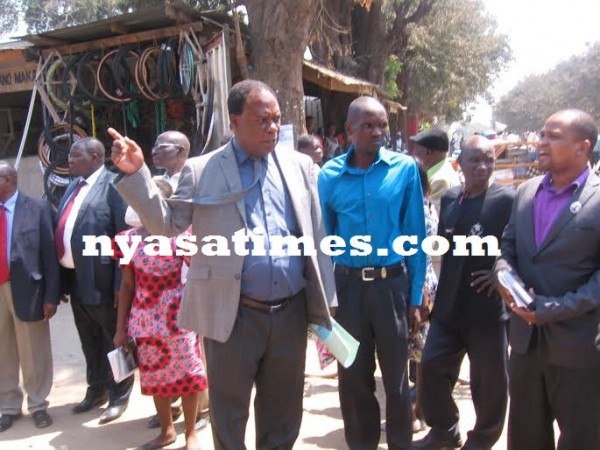 Kang'ombe visiting the illegal shops in Karonga[/caption]
[caption id="attachment_94108" align="alignright" width="600"]
Kang'ombe visiting the illegal shops in Karonga[/caption]
[caption id="attachment_94108" align="alignright" width="600"]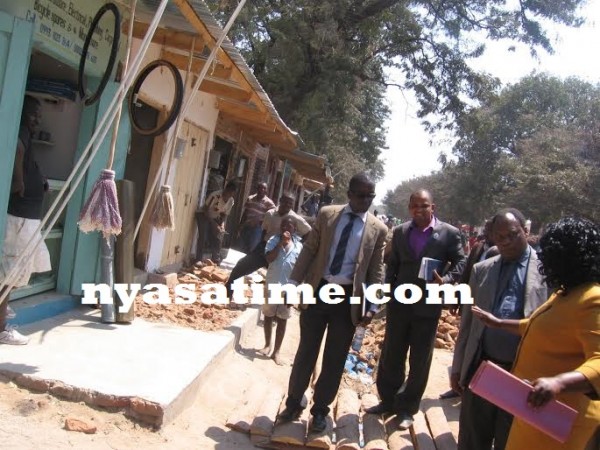 DC Rosemary Moyo explaining to the PS on the newly constructed shops[/caption]
[caption id="attachment_94109" align="alignright" width="600"]
DC Rosemary Moyo explaining to the PS on the newly constructed shops[/caption]
[caption id="attachment_94109" align="alignright" width="600"]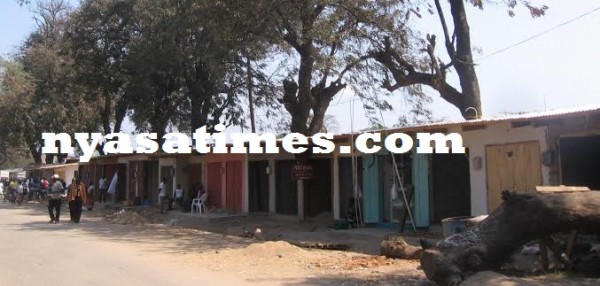 The 'illegal' shops in Karonga[/caption]
On Wednesday this week during an emergency full council meeting, Paramount Chief Kyungu issued a last decision of stopping the council to demolish the said shops after the development brought disagreement between the councillors and government officials claiming that he is avoiding violence if the council will follow the law.
However, Kang’ombe attacked the decision, arguing that the site is dangerous for construction and that the land demarcation procedurals were illegal.
Karonga DC and local councillors have been fighting over land distribution to vendors outside the main bus depot where shops have since been constructed.
While the council chairperson Patrick Kishombe claimed that it is within the councillors’ legal mandate through the market committee to allocate plots to business people within the market area, District Commissioner Rosemary Moyo accused Kishombe and his team of bringing confusion to the council and flouting procedures.
Chairperson of the Health Committee, Harry Mwanyembe, also accused Moyo of overstretching the matter to hide “fraud” acts under her administration.
Speaking during a visit to the district on Friday with the aim of sorting out the confusion, Kang’ombe said ge was shocked to hear that the council called for emergency meeting on Wednesday to resolve the issue while stakeholders were communicated of his coming.
“It is very pathetic that we are tolerating wrong doings to continue taking place in our country because as of this situation technical advice were issued many times but people who were constructing the illegal shops still opted to break the law and twisted it as development,” said the PS.
“In true sense instead of developing the district only few people who have benefited in taking the illegal land will be the ones improving their living standards on the expense of poor Malawian,” said Kang’ombe.
According to Kang’ombe , the shops acts as a trap to accidents claiming “within a period of a month two accidents have already occurred what more if those shops start functioning because trees are inside and some are on top of the septic tanks an indication that nothing positive will happen.”
However, Kang’ombe failed to change Kyungu’s decision but urged the District Commissioner to give out the minutes of the two meetings to the ministry as government officials wants the Law to take its cost.
He then pleaded with people in the district to let government officials to work professionally than fear.
The 'illegal' shops in Karonga[/caption]
On Wednesday this week during an emergency full council meeting, Paramount Chief Kyungu issued a last decision of stopping the council to demolish the said shops after the development brought disagreement between the councillors and government officials claiming that he is avoiding violence if the council will follow the law.
However, Kang’ombe attacked the decision, arguing that the site is dangerous for construction and that the land demarcation procedurals were illegal.
Karonga DC and local councillors have been fighting over land distribution to vendors outside the main bus depot where shops have since been constructed.
While the council chairperson Patrick Kishombe claimed that it is within the councillors’ legal mandate through the market committee to allocate plots to business people within the market area, District Commissioner Rosemary Moyo accused Kishombe and his team of bringing confusion to the council and flouting procedures.
Chairperson of the Health Committee, Harry Mwanyembe, also accused Moyo of overstretching the matter to hide “fraud” acts under her administration.
Speaking during a visit to the district on Friday with the aim of sorting out the confusion, Kang’ombe said ge was shocked to hear that the council called for emergency meeting on Wednesday to resolve the issue while stakeholders were communicated of his coming.
“It is very pathetic that we are tolerating wrong doings to continue taking place in our country because as of this situation technical advice were issued many times but people who were constructing the illegal shops still opted to break the law and twisted it as development,” said the PS.
“In true sense instead of developing the district only few people who have benefited in taking the illegal land will be the ones improving their living standards on the expense of poor Malawian,” said Kang’ombe.
According to Kang’ombe , the shops acts as a trap to accidents claiming “within a period of a month two accidents have already occurred what more if those shops start functioning because trees are inside and some are on top of the septic tanks an indication that nothing positive will happen.”
However, Kang’ombe failed to change Kyungu’s decision but urged the District Commissioner to give out the minutes of the two meetings to the ministry as government officials wants the Law to take its cost.
He then pleaded with people in the district to let government officials to work professionally than fear.

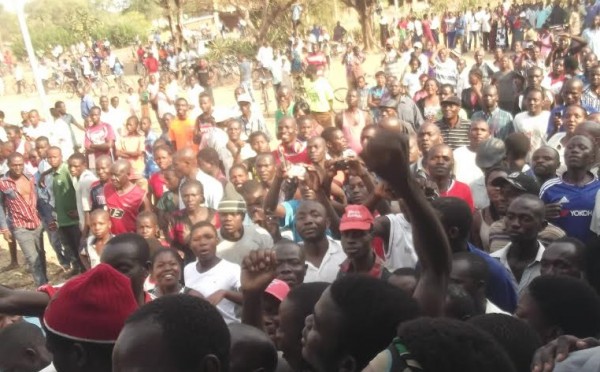 Karonga residents at the court -Photo by Tiwonge Kuwenda[/caption]
Fishani Mtambo aged 33 from Mukwavi Village in the area of Traditional Authority Mwenewenya in Chitipa and Wamisi Kawumba 32 of Cheyama Village in the Traditional Authority Kyungu in Karonga were arrested on Thursday last week suspected of abduction a 11 year old albino boy who was latter rescued by the surrounding community.
Prosecutor Peter Pilingu pleaded with the Magistrate not to continue with the hearing of the case, claiming that the Director of Public Prosecution Mary Kachali wants to give guidance on the matter before proceeding.
“Your honour before we start the hearing, please, I want to give out an appeal that we have just received a phone call from the DPP commanding us not to start the case today because they want to guide us how we should handle the case amicably,” said Pilingu.
Magistrate Nyirenda adjourned the case to 17th September allowing the police to prepare themselves for the case.
The development provoked crowds of people who besieged the court premised and they started pelting stones as they were suspecting that the police are planning to free the suspects.
Others threatened to torch the suspects but police has to whisk them away.
Police also fired tear gas but failed to arrest any person in connection to the stone throwing and no injuries were reported.
Albinos in Malawi are killed and dismembered due to a widespread belief that charms made from their body parts bring good fortune and prosperity.
It is claimed albino body parts can fetch thousands of dollars.
Albinism is a genetic condition characterised by a deficiency of melanin pigmentation in the skin, hair and eyes which protects from the sun's ultraviolet rays.
People suffering from the condition are discriminated against and persecuted in many African countries.
Karonga residents at the court -Photo by Tiwonge Kuwenda[/caption]
Fishani Mtambo aged 33 from Mukwavi Village in the area of Traditional Authority Mwenewenya in Chitipa and Wamisi Kawumba 32 of Cheyama Village in the Traditional Authority Kyungu in Karonga were arrested on Thursday last week suspected of abduction a 11 year old albino boy who was latter rescued by the surrounding community.
Prosecutor Peter Pilingu pleaded with the Magistrate not to continue with the hearing of the case, claiming that the Director of Public Prosecution Mary Kachali wants to give guidance on the matter before proceeding.
“Your honour before we start the hearing, please, I want to give out an appeal that we have just received a phone call from the DPP commanding us not to start the case today because they want to guide us how we should handle the case amicably,” said Pilingu.
Magistrate Nyirenda adjourned the case to 17th September allowing the police to prepare themselves for the case.
The development provoked crowds of people who besieged the court premised and they started pelting stones as they were suspecting that the police are planning to free the suspects.
Others threatened to torch the suspects but police has to whisk them away.
Police also fired tear gas but failed to arrest any person in connection to the stone throwing and no injuries were reported.
Albinos in Malawi are killed and dismembered due to a widespread belief that charms made from their body parts bring good fortune and prosperity.
It is claimed albino body parts can fetch thousands of dollars.
Albinism is a genetic condition characterised by a deficiency of melanin pigmentation in the skin, hair and eyes which protects from the sun's ultraviolet rays.
People suffering from the condition are discriminated against and persecuted in many African countries.

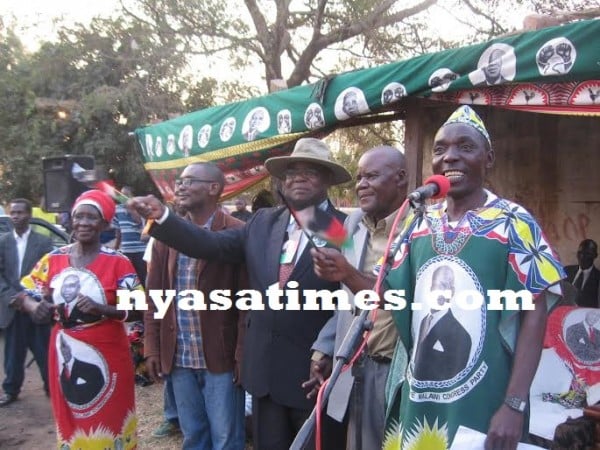 MCP officials welcoming Mwalwanda.-Photo by Tiwonge Kumwenda[/caption]
[caption id="attachment_94294" align="alignright" width="600"]
MCP officials welcoming Mwalwanda.-Photo by Tiwonge Kumwenda[/caption]
[caption id="attachment_94294" align="alignright" width="600"]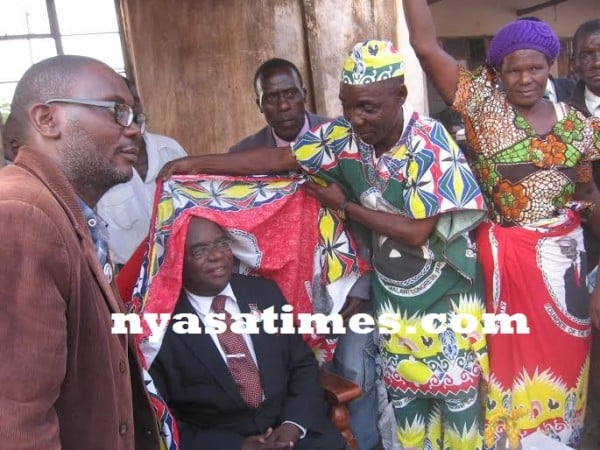 Nkhoma welcoming Mwalwanda[/caption]
Speaking during a regional welcome rally which was held at MCP offices in Karonga the northern part of Malawi, Mwalwanda , who was formerly a People’s Party (PP) members and also served DPP, said he want to be part of MCP renaissance.
According to Mwalwanda , an economist, Malawians are facing numerous economic and developmental hardships and that there is increasing poverty levels in the country.
MCP has since given him the position of Deputy Director of Economic Planning in the National Executive Committee (NEC).
“I have joined MCP because its policies are sound and under the leadership of Dr Lazarous Chakwera. There is no doubt whatsoever that MCP is the party that will be develop Malawi,” said Mwalwanda.
He refuted reports that he applied to rejoin the DPP and that they rejected him.
“I decided to join MCP because of its people-centred policies,” said Mwalwanda.
“I have to mention here that I have found a home in MCP because to say the truth PP embarrassed me by playing a double standards with my long term rival (Frank Tumpale Mwenefumbo) as its candidates in Karonga Central Constituency, a development led to violence hence the party is history to me,” said Mwalwanda.
In his remarks, the District MCP Chairperson Emmanuel Khoma said the door is open for any one to join the party as it is rebuilding.
Mwalwanda served in the DPP under the late president Bingu wa Mutharika. After Mutharika’s death in 2012, he joined People’s Party under Joyce Banda. He was member of Parliament for Karonga Central Constituency.
Nkhoma welcoming Mwalwanda[/caption]
Speaking during a regional welcome rally which was held at MCP offices in Karonga the northern part of Malawi, Mwalwanda , who was formerly a People’s Party (PP) members and also served DPP, said he want to be part of MCP renaissance.
According to Mwalwanda , an economist, Malawians are facing numerous economic and developmental hardships and that there is increasing poverty levels in the country.
MCP has since given him the position of Deputy Director of Economic Planning in the National Executive Committee (NEC).
“I have joined MCP because its policies are sound and under the leadership of Dr Lazarous Chakwera. There is no doubt whatsoever that MCP is the party that will be develop Malawi,” said Mwalwanda.
He refuted reports that he applied to rejoin the DPP and that they rejected him.
“I decided to join MCP because of its people-centred policies,” said Mwalwanda.
“I have to mention here that I have found a home in MCP because to say the truth PP embarrassed me by playing a double standards with my long term rival (Frank Tumpale Mwenefumbo) as its candidates in Karonga Central Constituency, a development led to violence hence the party is history to me,” said Mwalwanda.
In his remarks, the District MCP Chairperson Emmanuel Khoma said the door is open for any one to join the party as it is rebuilding.
Mwalwanda served in the DPP under the late president Bingu wa Mutharika. After Mutharika’s death in 2012, he joined People’s Party under Joyce Banda. He was member of Parliament for Karonga Central Constituency.

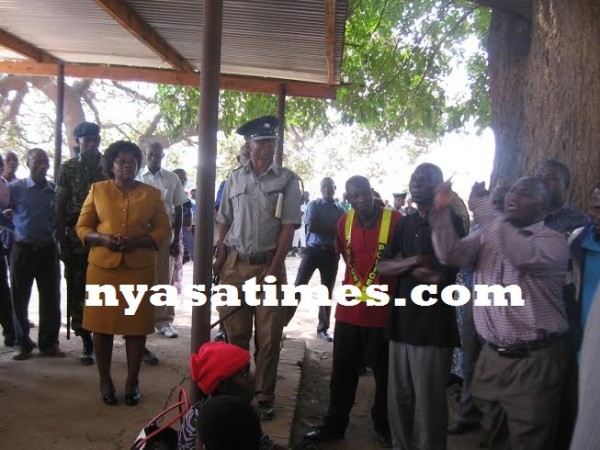 One of the workers telling the DC to leave her office peacefully or be removed violently[/caption]
[caption id="attachment_94993" align="alignright" width="600"]
One of the workers telling the DC to leave her office peacefully or be removed violently[/caption]
[caption id="attachment_94993" align="alignright" width="600"]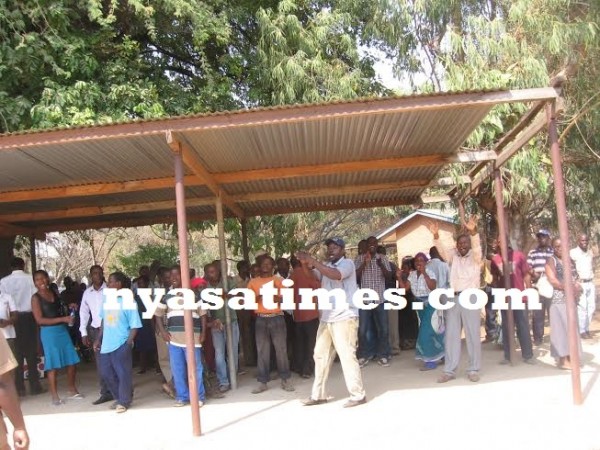 Karonga workers holding demo at DC[/caption]
[caption id="attachment_94994" align="alignright" width="600"]
Karonga workers holding demo at DC[/caption]
[caption id="attachment_94994" align="alignright" width="600"]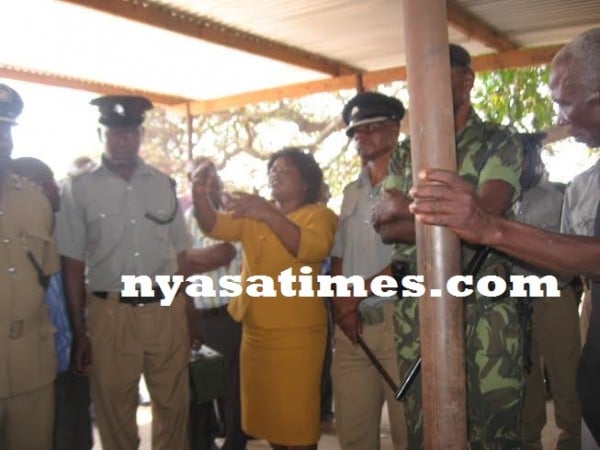 DC Moyo surrounded by police telling workers she has accepted her being 'overthrown'[/caption]
[caption id="attachment_94992" align="alignright" width="600"]
DC Moyo surrounded by police telling workers she has accepted her being 'overthrown'[/caption]
[caption id="attachment_94992" align="alignright" width="600"]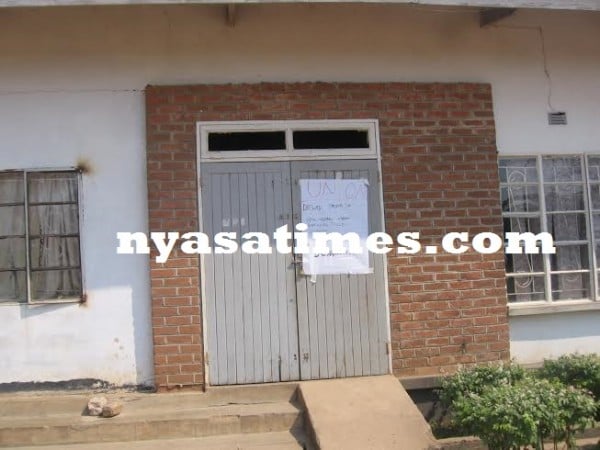 Karonga DC's office sealed[/caption]
Hundreds of workers who stormed the DC’s office threatened mob justice if the three officials will report for duties.
Chairperson for Karonga Council workers Union, Bentry Chihana, said that employees are “fed up” with the behaviour of the DC, including the Human Resource Manager Alick Milimbo and Monitoring and Evaluation Officer Emmanuel Sohaya.
According to Chihana, many petitions have been submitted to the DC’s office citing the problems that the workers are facing but there has been inaction.
DC Moyo is accused of delaying to pay salaries to the workers, water and electricity bills, nepotism and questionable staff rotation.
“We don’t need the District Commissioner and her two friends Milimbo and Sohaya in Karonga because they have failed to run the council. We have been patient for a long time giving them petitions even being on round table discussions expressing our concerns but we have seen no change,” said Chihana.
Adding that “this is the fourth month we have not received our salaries and as am speaking in all government offices, rest houses, bars and restraints there is no water and electricity; how can things run in such condition? That is why we are saying they have failed to run the district the only thing is for them to leave the premises and the doors will still be closed till new staff come in.”
The Regional Council Workers Union Director Suzgani Kayira backed the Karonga council workers saying “we cannot blame these people because we also petitioned the DC.”
DC Moyo said accepted the demands to abdicate her office.
“I have no problem with their demand. If the people are forcing me out of this district, why I should be here?” said Moyo who was escorted home by police.
Meanwhile, the Karonga district council chair person Patrick Kishombe has called for the emergency meeting Friday.
Karonga DC's office sealed[/caption]
Hundreds of workers who stormed the DC’s office threatened mob justice if the three officials will report for duties.
Chairperson for Karonga Council workers Union, Bentry Chihana, said that employees are “fed up” with the behaviour of the DC, including the Human Resource Manager Alick Milimbo and Monitoring and Evaluation Officer Emmanuel Sohaya.
According to Chihana, many petitions have been submitted to the DC’s office citing the problems that the workers are facing but there has been inaction.
DC Moyo is accused of delaying to pay salaries to the workers, water and electricity bills, nepotism and questionable staff rotation.
“We don’t need the District Commissioner and her two friends Milimbo and Sohaya in Karonga because they have failed to run the council. We have been patient for a long time giving them petitions even being on round table discussions expressing our concerns but we have seen no change,” said Chihana.
Adding that “this is the fourth month we have not received our salaries and as am speaking in all government offices, rest houses, bars and restraints there is no water and electricity; how can things run in such condition? That is why we are saying they have failed to run the district the only thing is for them to leave the premises and the doors will still be closed till new staff come in.”
The Regional Council Workers Union Director Suzgani Kayira backed the Karonga council workers saying “we cannot blame these people because we also petitioned the DC.”
DC Moyo said accepted the demands to abdicate her office.
“I have no problem with their demand. If the people are forcing me out of this district, why I should be here?” said Moyo who was escorted home by police.
Meanwhile, the Karonga district council chair person Patrick Kishombe has called for the emergency meeting Friday.

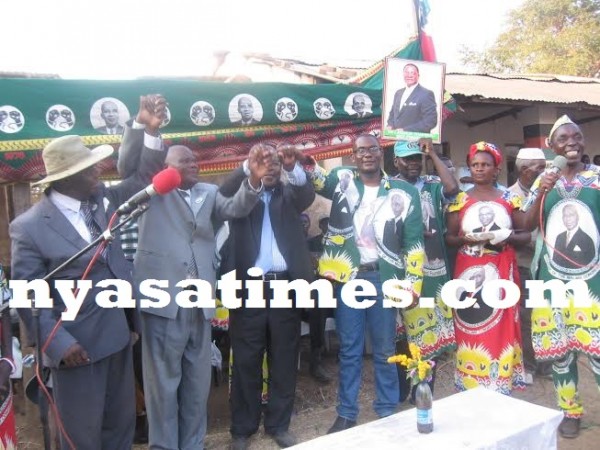 MCP welcomes Sikanda[/caption]
[caption id="attachment_95498" align="alignright" width="600"]
MCP welcomes Sikanda[/caption]
[caption id="attachment_95498" align="alignright" width="600"]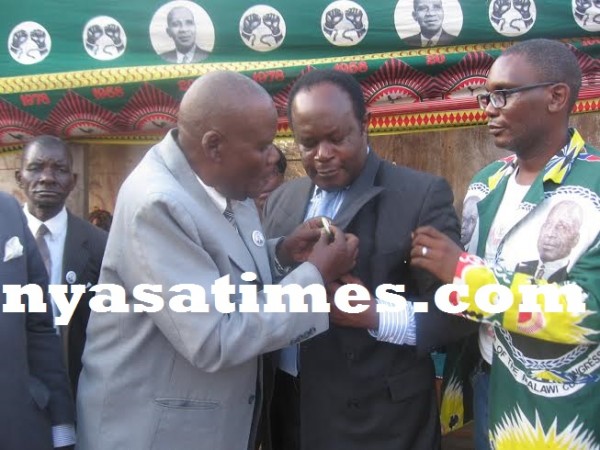 Sikanda being given MCP badge[/caption]
[caption id="attachment_95496" align="alignright" width="600"]
Sikanda being given MCP badge[/caption]
[caption id="attachment_95496" align="alignright" width="600"]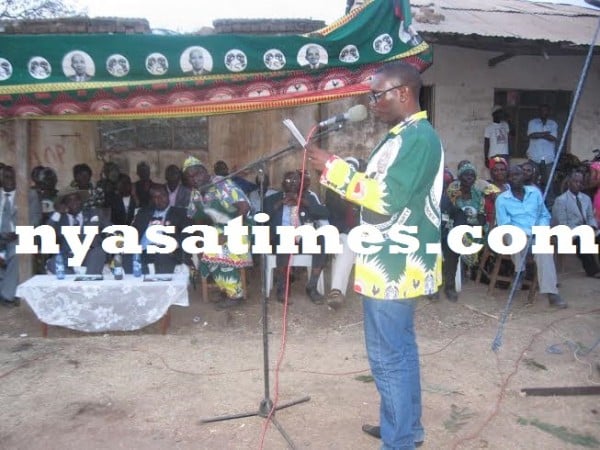 Munde: Sikanda will be the rightful candidate for MP seat[/caption]
This follows the welcoming of economist and former Deputy Minister of Finance Dr Cornelius Mwalwanda two weeks ago.
Sikanda, who has been also appointed as the second Deputy Director of Research in the National Executive Committee (NEC) for the MCP by its president Dr Lazarus Chakwera, has been working with the UNCHR for 21 years as Head of Desk in Geneva as well as the country’s Chief Social Welfare for 6 years and is currently lecturing at the University of Livingstonia.
Speaking during the welcome rally, Sikanda said that he has decided to join MCP after seeing that the party has the natural tendency of helping people as well as leaders with political maturity.
“MCP is the only party which has leaders who are capable to deliver for the nation. MCP is the solution for the country and my coming is just boosting it,” said Sikanda.
He said because the majority of Malawians placed their hope in the MCP to "take them to the promised land", it was important for the party leaders to prioritise unity among themselves.
"We are unstoppable and we are taking the MCP to the centre ground of politics and we are saying 2019 when the next elections will be held), here we come,” said Sikanda.
Sikanda said his focus now is making sure that the party is reinvigorated to emerge a strong front come 2019.
“I will help MCP to be bigger, better and more formidable,” he said.
Sikanda said Malawians demand “true national leadership” that can begin to address the multi-layered crisis facing this nation.
In his remarks, Walusako Munde who is MCP Deputy Region Secretary for the Northern Province who stood as MCP MP Candidate for Karonga North-West declared that with the coming in of Sikanda, he will not contest in 2019, paving way for the new entrant.
“Every one of you knows that I stood for MCP but today I am crowning Sikanda as your shadow MP,” said Munde
The MCP district Chairperson Emmanuel Nkhoma and Mwalwanda described the party’s fast expansion in the province as the sign of winning the 2019 general election.
Meanwhile, the party has 14 National Executive Committee members in the region.
Munde: Sikanda will be the rightful candidate for MP seat[/caption]
This follows the welcoming of economist and former Deputy Minister of Finance Dr Cornelius Mwalwanda two weeks ago.
Sikanda, who has been also appointed as the second Deputy Director of Research in the National Executive Committee (NEC) for the MCP by its president Dr Lazarus Chakwera, has been working with the UNCHR for 21 years as Head of Desk in Geneva as well as the country’s Chief Social Welfare for 6 years and is currently lecturing at the University of Livingstonia.
Speaking during the welcome rally, Sikanda said that he has decided to join MCP after seeing that the party has the natural tendency of helping people as well as leaders with political maturity.
“MCP is the only party which has leaders who are capable to deliver for the nation. MCP is the solution for the country and my coming is just boosting it,” said Sikanda.
He said because the majority of Malawians placed their hope in the MCP to "take them to the promised land", it was important for the party leaders to prioritise unity among themselves.
"We are unstoppable and we are taking the MCP to the centre ground of politics and we are saying 2019 when the next elections will be held), here we come,” said Sikanda.
Sikanda said his focus now is making sure that the party is reinvigorated to emerge a strong front come 2019.
“I will help MCP to be bigger, better and more formidable,” he said.
Sikanda said Malawians demand “true national leadership” that can begin to address the multi-layered crisis facing this nation.
In his remarks, Walusako Munde who is MCP Deputy Region Secretary for the Northern Province who stood as MCP MP Candidate for Karonga North-West declared that with the coming in of Sikanda, he will not contest in 2019, paving way for the new entrant.
“Every one of you knows that I stood for MCP but today I am crowning Sikanda as your shadow MP,” said Munde
The MCP district Chairperson Emmanuel Nkhoma and Mwalwanda described the party’s fast expansion in the province as the sign of winning the 2019 general election.
Meanwhile, the party has 14 National Executive Committee members in the region.

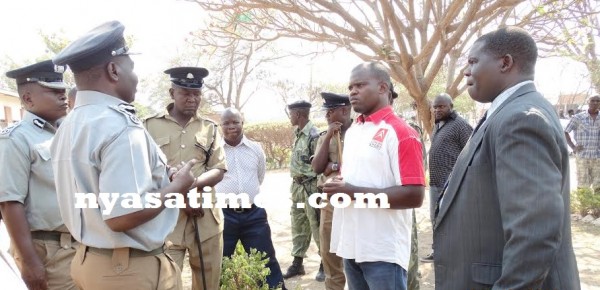 Officer in charge for Karonga Police Edward Chingayipe talking with the group, Mzembe in black suit-Photo by Tiwonge Kumwenda[/caption]
[caption id="attachment_95709" align="alignright" width="600"]
Officer in charge for Karonga Police Edward Chingayipe talking with the group, Mzembe in black suit-Photo by Tiwonge Kumwenda[/caption]
[caption id="attachment_95709" align="alignright" width="600"]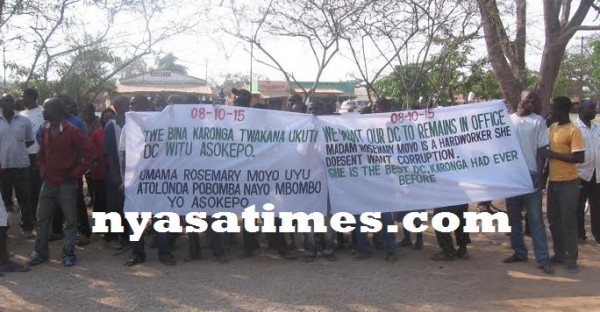 The group carrying baner at the DC office.-Photo by Tiwonge Kumwenda[/caption]
On 24 September this year, Moyo was kicked out of her office by the irate council workers on the accusations of poor working conditions such as exorbitant pension deductions and delayed salaries.
Chairperson for the workers union, Bentley Chihana, alleges hat since Moyo assumed the office of Karonga DC, the workers’ welfare has declined significantly.
T he development which prompted the DC to obtain an injunction from Mzuzu high court restricting workers from stopping her from working.
And a group emerged to counter the irate workers from stopping Moyo going to work.
According to the district chairperson for Karonga main market Godwin Ghambi, he was approached by the ex-militant Blockry Mzembe who he described as Moyo agent to back the DC.
“I believe that the group has been hired by the DC because I was also approached by Mzembe who was sent by Moyo to support her to resume work but I denied,” disclose Ghambi.
The hired group which are calling themselves as the concern residents stormed at the DC’s office on Thursday with the petition, expressing their dissatisfactory against the direct employee’s decision to forcibly remove the District Commissioner.
The group petition which was led by the business person Blockry Mzembe based in Nyungwe the southern part of the district carrying the signatories of Steve Simsokwe of Youth for justice and development, Jalako Mwenefumbo of Tutulane palikimo, Abraham Mwakhwawa for Sports among others claimed that the concerned workers are not happy with the DC’s working conditions as she is trying to seal the loopholes of corruption which is reported to be rampant at the district council.
According to the petition, some senior workers within the DC’s office are involved in the malpractice hence they are using the junior staffs to revolt against Moyo as a way of hiding their wrong doings.
“As a concern group we have been following the issue of DC and her workers with keen interest hence we have found out that some workers at the council are involved in the corruption malpractices which Moyo is trying to unveil,” cited the Petition.
Adding that “a clearly example is the misunderstanding which is going on between the DC and the Councilors following the plot allocation at the bus depot in which Moyo is insisting that the law should take its course.”
District Chairperson Councilor Patrick Kishombe said he cannot comment on the matter as the issue is in the hands of the Ministry of Local Government.
Meanwhile the workers and vendors have planned to vacate the court order obtained by Moyo at the Mzuzu high court on Friday as they continue strike.
According to the document signed by the Chairperson for Karonga business community who is also the legal advisor for the two groups, Moyo should vacate the injunction within 24 hours failing which the group will go to the court themselves.
The irate staff has also called for the transfer of their Human Resource Officer Tamika Milimbo and Acting Director of Planning and Development (DPD) Emmanuel Sohaya, saying they were responsible for salary delays and workplace miseries.
Moyo, however, challenged she is going nowhere because she was not employed by the workers union.
The group carrying baner at the DC office.-Photo by Tiwonge Kumwenda[/caption]
On 24 September this year, Moyo was kicked out of her office by the irate council workers on the accusations of poor working conditions such as exorbitant pension deductions and delayed salaries.
Chairperson for the workers union, Bentley Chihana, alleges hat since Moyo assumed the office of Karonga DC, the workers’ welfare has declined significantly.
T he development which prompted the DC to obtain an injunction from Mzuzu high court restricting workers from stopping her from working.
And a group emerged to counter the irate workers from stopping Moyo going to work.
According to the district chairperson for Karonga main market Godwin Ghambi, he was approached by the ex-militant Blockry Mzembe who he described as Moyo agent to back the DC.
“I believe that the group has been hired by the DC because I was also approached by Mzembe who was sent by Moyo to support her to resume work but I denied,” disclose Ghambi.
The hired group which are calling themselves as the concern residents stormed at the DC’s office on Thursday with the petition, expressing their dissatisfactory against the direct employee’s decision to forcibly remove the District Commissioner.
The group petition which was led by the business person Blockry Mzembe based in Nyungwe the southern part of the district carrying the signatories of Steve Simsokwe of Youth for justice and development, Jalako Mwenefumbo of Tutulane palikimo, Abraham Mwakhwawa for Sports among others claimed that the concerned workers are not happy with the DC’s working conditions as she is trying to seal the loopholes of corruption which is reported to be rampant at the district council.
According to the petition, some senior workers within the DC’s office are involved in the malpractice hence they are using the junior staffs to revolt against Moyo as a way of hiding their wrong doings.
“As a concern group we have been following the issue of DC and her workers with keen interest hence we have found out that some workers at the council are involved in the corruption malpractices which Moyo is trying to unveil,” cited the Petition.
Adding that “a clearly example is the misunderstanding which is going on between the DC and the Councilors following the plot allocation at the bus depot in which Moyo is insisting that the law should take its course.”
District Chairperson Councilor Patrick Kishombe said he cannot comment on the matter as the issue is in the hands of the Ministry of Local Government.
Meanwhile the workers and vendors have planned to vacate the court order obtained by Moyo at the Mzuzu high court on Friday as they continue strike.
According to the document signed by the Chairperson for Karonga business community who is also the legal advisor for the two groups, Moyo should vacate the injunction within 24 hours failing which the group will go to the court themselves.
The irate staff has also called for the transfer of their Human Resource Officer Tamika Milimbo and Acting Director of Planning and Development (DPD) Emmanuel Sohaya, saying they were responsible for salary delays and workplace miseries.
Moyo, however, challenged she is going nowhere because she was not employed by the workers union.
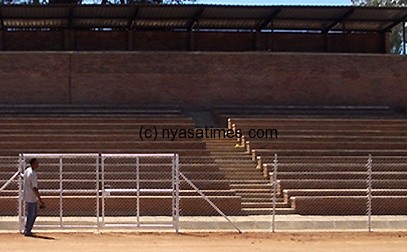
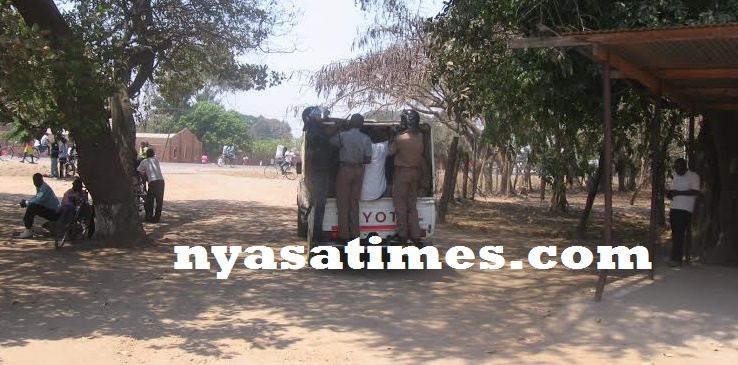
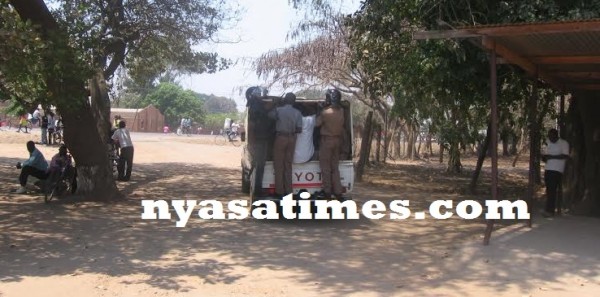 Police vehicle carrying workers to their station from DC's office[/caption]
[caption id="attachment_95956" align="alignright" width="600"]
Police vehicle carrying workers to their station from DC's office[/caption]
[caption id="attachment_95956" align="alignright" width="600"]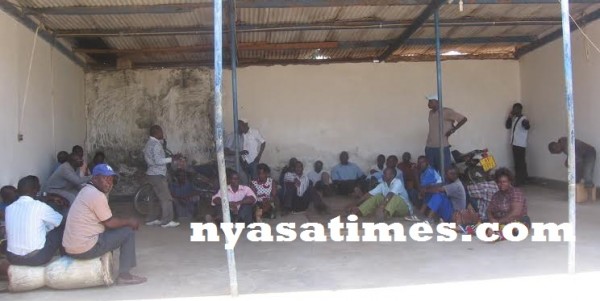 Karonga council strike workers at police station[/caption]
According to Moyo who appeared into office on Monday, the reports that she is on leave are unfounded, saying she is only learning them in the media.
But her return to council prompted the irate workers to boycott the work demanding she abdicates her office.
The incident forced Moyo to call the District Police Officer In charge Edward Chingayipe to lead his men to arrest the workers claiming that their decision was against her court injunction restraining them from forcing her out.
“Am here to do my usual duties, the issue that am on forced leave is not true,” said Moyo.
Chingayipe confirmed that 42 workers have been arrested who will appear before court to answer charges of contempt of court.
“We are here to make sure that there is peace at government offices as well as to protect lives and properties so the workers do not have powers to remove the DC from her office on top of that there is an injunction restraining them not to overthrow the person in question that is why we have arrested them so that others should take a lesson,” said Chingayipe.
The Principle Secretary of the Ministry of Local Government and Urban Development Christ Kang’ombe confirmed to media that Rosemary Moyo was given a leave with effect from Monday until government sort out the issue to avoid bloodshed as the two fail to settle down the matter.
Meanwhile, the Civil Society Organizations (CSOs) in the district have condemned the “arbitrary” arrest of the workers and demand their immediate release.
According to the petition signed by Karonga CSO’s Network Chairperson Yotam Kaunda, the District Chairperson of Public Affairs Committee (PAC) Rev. Lesile Mtekateka and Jabesi Nyirenda of Foundation for Community Support Services ( FOCUS) among others, the court injunction does not restrict workers from exercising a peaceful demonstration.
“As Civil Society Organizations in Karonga we have learnt with great shock that our Law enforcers are in forefront violating their law by arresting the council direct employees in the name of court injunction,” cited the petition.
“Section 38 of the republic of Malawi allows any person to express their freedom of sit in protest and demonstrate with others peacefully which was the case with the workers on top of that the injunction granted by Justice Dingiswayo Madise of Mzuzu High court does not restrain the employee to have a sit in protest, hence we demand their immediate release because what the police have done is a gross violation of human rights.”
On 24 September this year, Moyo was kicked out of her office by the irate council workers as they alleged that Moyo was responsible for their poor working conditions such as exorbitant pension deductions and delayed salaries.
Chairperson for the workers union, Bentley Chihana, alleged that since Moyo assumed the office of Karonga DC, the workers’ welfare has declined significantly.
Karonga council strike workers at police station[/caption]
According to Moyo who appeared into office on Monday, the reports that she is on leave are unfounded, saying she is only learning them in the media.
But her return to council prompted the irate workers to boycott the work demanding she abdicates her office.
The incident forced Moyo to call the District Police Officer In charge Edward Chingayipe to lead his men to arrest the workers claiming that their decision was against her court injunction restraining them from forcing her out.
“Am here to do my usual duties, the issue that am on forced leave is not true,” said Moyo.
Chingayipe confirmed that 42 workers have been arrested who will appear before court to answer charges of contempt of court.
“We are here to make sure that there is peace at government offices as well as to protect lives and properties so the workers do not have powers to remove the DC from her office on top of that there is an injunction restraining them not to overthrow the person in question that is why we have arrested them so that others should take a lesson,” said Chingayipe.
The Principle Secretary of the Ministry of Local Government and Urban Development Christ Kang’ombe confirmed to media that Rosemary Moyo was given a leave with effect from Monday until government sort out the issue to avoid bloodshed as the two fail to settle down the matter.
Meanwhile, the Civil Society Organizations (CSOs) in the district have condemned the “arbitrary” arrest of the workers and demand their immediate release.
According to the petition signed by Karonga CSO’s Network Chairperson Yotam Kaunda, the District Chairperson of Public Affairs Committee (PAC) Rev. Lesile Mtekateka and Jabesi Nyirenda of Foundation for Community Support Services ( FOCUS) among others, the court injunction does not restrict workers from exercising a peaceful demonstration.
“As Civil Society Organizations in Karonga we have learnt with great shock that our Law enforcers are in forefront violating their law by arresting the council direct employees in the name of court injunction,” cited the petition.
“Section 38 of the republic of Malawi allows any person to express their freedom of sit in protest and demonstrate with others peacefully which was the case with the workers on top of that the injunction granted by Justice Dingiswayo Madise of Mzuzu High court does not restrain the employee to have a sit in protest, hence we demand their immediate release because what the police have done is a gross violation of human rights.”
On 24 September this year, Moyo was kicked out of her office by the irate council workers as they alleged that Moyo was responsible for their poor working conditions such as exorbitant pension deductions and delayed salaries.
Chairperson for the workers union, Bentley Chihana, alleged that since Moyo assumed the office of Karonga DC, the workers’ welfare has declined significantly.

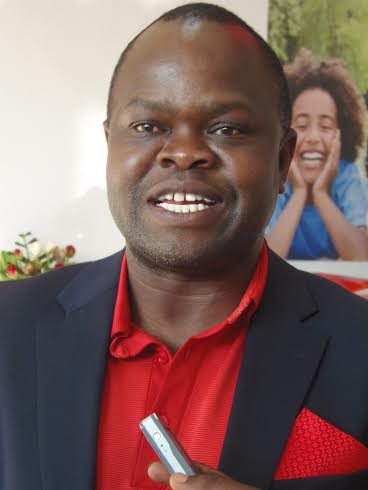 Imani: Airtel opens Express shop Karonga[/caption]
[caption id="attachment_96141" align="alignright" width="600"]
Imani: Airtel opens Express shop Karonga[/caption]
[caption id="attachment_96141" align="alignright" width="600"]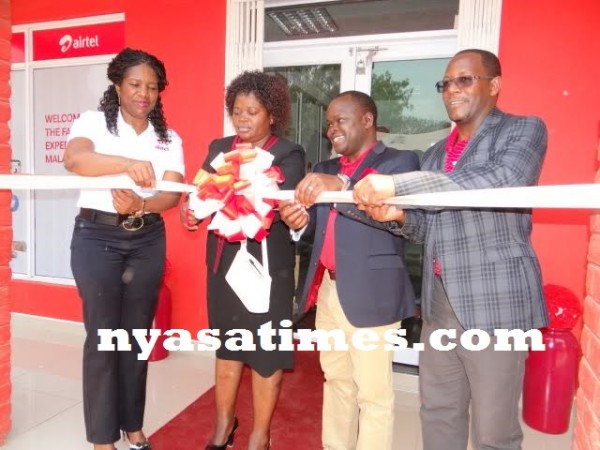 Opening of Airtel Express Shop in Karonga. Pic by Chancy Gondwe, Nyasa Times[/caption]
Customers who spoke to Nyasa Times said that the shop has become a convenient avenue where they can access Airtel Malawi services at one place.
“We don’t have to move around in search for the services in different places,” said Yohane Sinyangwe, a minibus driver.
The shop, opened two weeks ago, offers among others Airtel Money services and sale of several other products the company offers.
Karonga District Commissioner (DC) Rosemary Moyo had said during the launch that the opening of the shop was “a timely intervention.”
And Airtel Malawi Sales Director Elias Imaan had said the company “believes in offering satisfactory services to customers.”
Airtel Malawi has approximately 3.5 million subscribers in the country.
Opening of Airtel Express Shop in Karonga. Pic by Chancy Gondwe, Nyasa Times[/caption]
Customers who spoke to Nyasa Times said that the shop has become a convenient avenue where they can access Airtel Malawi services at one place.
“We don’t have to move around in search for the services in different places,” said Yohane Sinyangwe, a minibus driver.
The shop, opened two weeks ago, offers among others Airtel Money services and sale of several other products the company offers.
Karonga District Commissioner (DC) Rosemary Moyo had said during the launch that the opening of the shop was “a timely intervention.”
And Airtel Malawi Sales Director Elias Imaan had said the company “believes in offering satisfactory services to customers.”
Airtel Malawi has approximately 3.5 million subscribers in the country.

 Gruesome murder: Jungle justice in Karonga[/caption]
The couple were burned to ashes, relatives who witnessed the horrific attack revealed.
According to Karonga Police Spokesperson Enock Livasoni, for the past three weeks, three people have been killed by a mysterious crocodile which exist in a village nearby river hence the residents suspected that it belongs to the couple.
Livasoni identified the mob justice victims as a 76 old man Taipi Vinkhumbo of Mtendere village Traditional Authority Kyungu and a 65 old woman Marinara Vinkhumbo of Mwanyesha village in the same area.
“The couple was being suspected of practicing witchcraft due to the death of three people who were attacked by crocodile for the past three weeks,” said Rivasoni.
“They were assaulted and then the mob took them to their home kitchen where they burned the victims inside. We only found ashes and no body.”
The couple were screaming, begging for mercy and saying they have not committed any sin.
Meanwhile, Livasoni said no arrest has been made as investigations are still under way.
He said the suspicion of witchcraft was unfounded.
Karonga District Council chairperson Patrick Kisyombe said the council will come up with by-laws to protect people accused of witchcraft, saying some of accusations “are out of jealousy. “
He said: “When someone is doing well they are often suspected of witchcraft, so we need to protect people by coming up with by-laws.”
There are beliefs in Karonga that people breed magical crocodiles to attack their enemies. A number of people have been victims of crocodile attacks allegedly initiated by their foes although there is no proof.
Gruesome murder: Jungle justice in Karonga[/caption]
The couple were burned to ashes, relatives who witnessed the horrific attack revealed.
According to Karonga Police Spokesperson Enock Livasoni, for the past three weeks, three people have been killed by a mysterious crocodile which exist in a village nearby river hence the residents suspected that it belongs to the couple.
Livasoni identified the mob justice victims as a 76 old man Taipi Vinkhumbo of Mtendere village Traditional Authority Kyungu and a 65 old woman Marinara Vinkhumbo of Mwanyesha village in the same area.
“The couple was being suspected of practicing witchcraft due to the death of three people who were attacked by crocodile for the past three weeks,” said Rivasoni.
“They were assaulted and then the mob took them to their home kitchen where they burned the victims inside. We only found ashes and no body.”
The couple were screaming, begging for mercy and saying they have not committed any sin.
Meanwhile, Livasoni said no arrest has been made as investigations are still under way.
He said the suspicion of witchcraft was unfounded.
Karonga District Council chairperson Patrick Kisyombe said the council will come up with by-laws to protect people accused of witchcraft, saying some of accusations “are out of jealousy. “
He said: “When someone is doing well they are often suspected of witchcraft, so we need to protect people by coming up with by-laws.”
There are beliefs in Karonga that people breed magical crocodiles to attack their enemies. A number of people have been victims of crocodile attacks allegedly initiated by their foes although there is no proof.




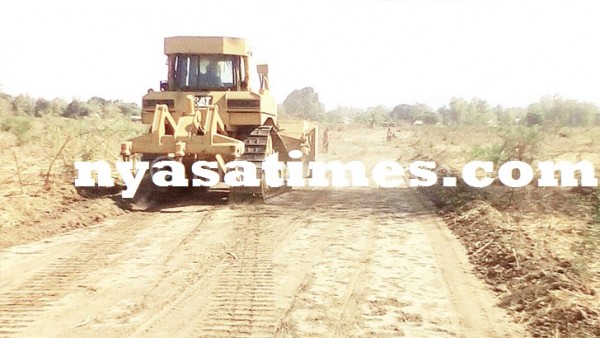 Work in progress for Karonga stadium[/caption]
“It is very pleasing that construction work at Karonga Stadium has commenced,” said Kyungu, an influential chief in northern border district.
The site for the stadium is at Baka Research Station in the area of Paramount Chief Kyungu.<
Government handed over the site to Nangaunozge Building Contractors to start constructing the stadium early last month.
Karonga district commissioner Rosemary Moyo said the construction works for Karonga Stadium have finally commenced.
“The contractors are on the ground,” she said.
Moyo hopes that the facility will be ready for use in not too distant future.
She said the stadium is a “big project that demands contractors to be given enough time to mobilise resources.”
Community chairperson for Karonga Stadium construction project, Kossam Munthali, said they are monitoring the construction progress .
Work in progress for Karonga stadium[/caption]
“It is very pleasing that construction work at Karonga Stadium has commenced,” said Kyungu, an influential chief in northern border district.
The site for the stadium is at Baka Research Station in the area of Paramount Chief Kyungu.<
Government handed over the site to Nangaunozge Building Contractors to start constructing the stadium early last month.
Karonga district commissioner Rosemary Moyo said the construction works for Karonga Stadium have finally commenced.
“The contractors are on the ground,” she said.
Moyo hopes that the facility will be ready for use in not too distant future.
She said the stadium is a “big project that demands contractors to be given enough time to mobilise resources.”
Community chairperson for Karonga Stadium construction project, Kossam Munthali, said they are monitoring the construction progress .

 That death crimes as well as witchcraft cases have reached unimaginable levels in the country is no longer far-fetched. Innocent people continue to be butchered like animals in our communities on unfounded allegations that they are into the witchcraft thing, among others. Hardly a month passes these days before a murder, courtesy of mob justice, is heard.
The formation of the commission is, therefore, a very welcome development.
As Kyungu rightly pointed out, we hope the commission will stamp deep rooted strategies that will protect innocent people from dying for nothing.
We at Nyasa Times further hope that this ‘peace and security commission’ will work indeed work hand in hand with the police and all concerned stakeholders; and, that trivial tribal affiliations will not jeopardize this otherwise noble cause.
We hope that other senior leaders will embrace the same, and establish such structures in their respective areas for it is them that are closer to people at the grassroots than any other individuals or institutions we may know or think of.
That death crimes as well as witchcraft cases have reached unimaginable levels in the country is no longer far-fetched. Innocent people continue to be butchered like animals in our communities on unfounded allegations that they are into the witchcraft thing, among others. Hardly a month passes these days before a murder, courtesy of mob justice, is heard.
The formation of the commission is, therefore, a very welcome development.
As Kyungu rightly pointed out, we hope the commission will stamp deep rooted strategies that will protect innocent people from dying for nothing.
We at Nyasa Times further hope that this ‘peace and security commission’ will work indeed work hand in hand with the police and all concerned stakeholders; and, that trivial tribal affiliations will not jeopardize this otherwise noble cause.
We hope that other senior leaders will embrace the same, and establish such structures in their respective areas for it is them that are closer to people at the grassroots than any other individuals or institutions we may know or think of.

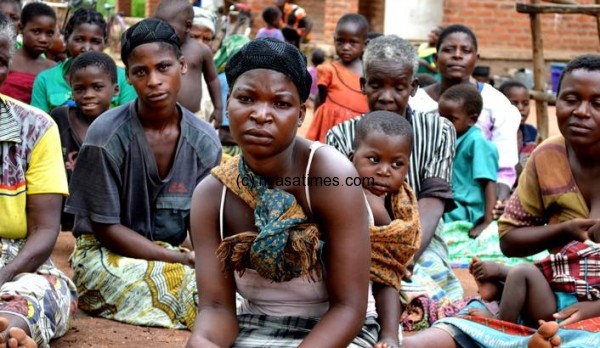 Flood vicitms in February[/caption]
The claim was made recently in Karonga when the Ministry of Natural Resources, Energy and Mines through the department of climate change and metrological services launched a 'national weather campaign for the 2015-2016 rainy season' aimed at reducing the disaster that Malawi faced last season.
The department's head of public weather Elinah Kalulanga said it was “unfortunate” that the NGOs were behaving in the manner without providing alternative solutions.
“We've decided to hold meetings with you chiefs because we know that you are the most reliable in the community. What you have to know is that our weather forecast for this rainy season indicates that the country will have heavy incessant rains associated with thunderstorms that will end up in the shortest period of time,” said Kalulanga.
She then asked chiefs in the area to re-allocate their subjects from flood prone areas to upper lands.
Traditional Authority Kilipula, whose area is the most hit by flood in the district, said he will try to “convince his subjects to reallocate to the upper lands” but asked the department to come up with such information in time so that all process of constructing water conservation areas as well as reallocations should not be in panic one.”
Malawi has already started experiencing heavy rains in many parts including Mzimba, Blantyre and some other parts of Lilongwe.
In Blantyre, especially in Limbe, most roads are now impassable because of the rains.
Last year, hundreds of people went missing and lost their lives while thousands were displaced.
Flood vicitms in February[/caption]
The claim was made recently in Karonga when the Ministry of Natural Resources, Energy and Mines through the department of climate change and metrological services launched a 'national weather campaign for the 2015-2016 rainy season' aimed at reducing the disaster that Malawi faced last season.
The department's head of public weather Elinah Kalulanga said it was “unfortunate” that the NGOs were behaving in the manner without providing alternative solutions.
“We've decided to hold meetings with you chiefs because we know that you are the most reliable in the community. What you have to know is that our weather forecast for this rainy season indicates that the country will have heavy incessant rains associated with thunderstorms that will end up in the shortest period of time,” said Kalulanga.
She then asked chiefs in the area to re-allocate their subjects from flood prone areas to upper lands.
Traditional Authority Kilipula, whose area is the most hit by flood in the district, said he will try to “convince his subjects to reallocate to the upper lands” but asked the department to come up with such information in time so that all process of constructing water conservation areas as well as reallocations should not be in panic one.”
Malawi has already started experiencing heavy rains in many parts including Mzimba, Blantyre and some other parts of Lilongwe.
In Blantyre, especially in Limbe, most roads are now impassable because of the rains.
Last year, hundreds of people went missing and lost their lives while thousands were displaced.

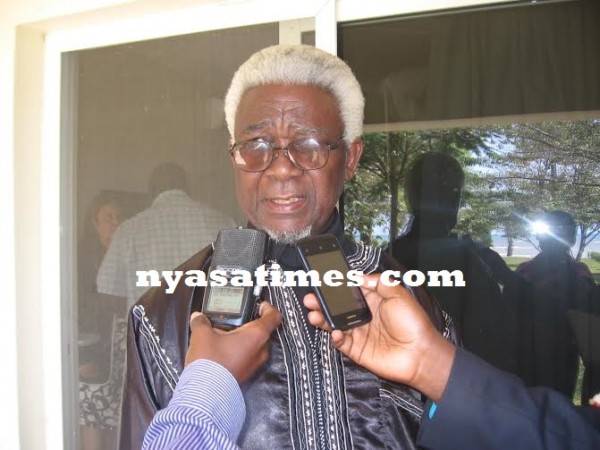 Kyungu: People want to know the outcome of the exploration exercise[/caption]
Studies and tests carried out some years ago established that there are huge deposits of oil and natural gas under Lake Malawi, a situation that automatically makes Malawi an investment haven.
Few years ago under the Peoples Party administration, government gave licences to foreign companies to commence the exploration. However, the deals were deemed to have lacked transparency and were put on hold by the DPP regime pending proper investigations on the procedures that involved the initial process.
Sensing a delay in the commencement of the process, the people of Karonga have been mobilizing to get traditional leaders, civil society and religious organizations on board to push for their cause.
Karonga Community Oil and Gas Committee spokesperson, Steve Musokwe, told Nyasa Times in an interview that whatever has been happening at administrative level should not affect locals who are bound to benefit greatly from the project.
“The commencement of the exploration is crucial to the economic and social welfare of the people of Karonga. As such we do not give too much concern on whether the deals were offered dubiously or not.
“Of course our President should follow up on the anomalies but the exploration can begin as the other issues are being sorted out,” he says.
Concurring with Musokwe is Undule Mwakasungula, chair of a task force that is also pushing for the same cause.
“The people here are justified to raise such issues because continued delay is a major concern. These are the people who expected so much from the much touted Kayerekera Uranium Mine and they feel that oil and gas will compensate for the losses they incurred as a community.
As things stand now, the people of Karonga need development nothing else and government can only offer this by speeding up the process,” says Mwakasungula.
Traditional leaders, led by Paramount Chief Kyungu, believe time has come for Karonga to drive the country’s development agenda through oil and gas.
“The extractive industry is a huge economic platform. We need exploration to start so as to transform the lives of our people through revenue and profits. The social transformation of our people here and the whole country lies in these precious commodities just beneath our beautiful lake,” says Kyungu.
When government suspended the deals, it sought the position of the Attorney General Kalekeni Kaphale who raised concerns that the country’s laws were breached in the awarding of the deals.
The licences were awarded as follows: Block 1was given to Sac Oil in 2012, Blocks 2 and 3were originally given to Surestream Petroleum in 2011, which farmed out 51 percent share of each block to Hamra Oil in February 2014.
Blocks 4 and 5 went to RAK Gas in 2013 and the last Block was awarded to Pacific Oil and Gas in 2013.
Principal Secretary for Energy and Mining Ben Botolo said the results will be issued when all matters regarding the suspension of the licences have been resolved.
“We are going to resume the discussion,” said Botolo.
Minister of Mining and Natural Resources, Bright Msaka, told the media recently that although speed on the matter is important, government is taking time to bring in genuine deals that benefit the people of Malawi.
Kyungu: People want to know the outcome of the exploration exercise[/caption]
Studies and tests carried out some years ago established that there are huge deposits of oil and natural gas under Lake Malawi, a situation that automatically makes Malawi an investment haven.
Few years ago under the Peoples Party administration, government gave licences to foreign companies to commence the exploration. However, the deals were deemed to have lacked transparency and were put on hold by the DPP regime pending proper investigations on the procedures that involved the initial process.
Sensing a delay in the commencement of the process, the people of Karonga have been mobilizing to get traditional leaders, civil society and religious organizations on board to push for their cause.
Karonga Community Oil and Gas Committee spokesperson, Steve Musokwe, told Nyasa Times in an interview that whatever has been happening at administrative level should not affect locals who are bound to benefit greatly from the project.
“The commencement of the exploration is crucial to the economic and social welfare of the people of Karonga. As such we do not give too much concern on whether the deals were offered dubiously or not.
“Of course our President should follow up on the anomalies but the exploration can begin as the other issues are being sorted out,” he says.
Concurring with Musokwe is Undule Mwakasungula, chair of a task force that is also pushing for the same cause.
“The people here are justified to raise such issues because continued delay is a major concern. These are the people who expected so much from the much touted Kayerekera Uranium Mine and they feel that oil and gas will compensate for the losses they incurred as a community.
As things stand now, the people of Karonga need development nothing else and government can only offer this by speeding up the process,” says Mwakasungula.
Traditional leaders, led by Paramount Chief Kyungu, believe time has come for Karonga to drive the country’s development agenda through oil and gas.
“The extractive industry is a huge economic platform. We need exploration to start so as to transform the lives of our people through revenue and profits. The social transformation of our people here and the whole country lies in these precious commodities just beneath our beautiful lake,” says Kyungu.
When government suspended the deals, it sought the position of the Attorney General Kalekeni Kaphale who raised concerns that the country’s laws were breached in the awarding of the deals.
The licences were awarded as follows: Block 1was given to Sac Oil in 2012, Blocks 2 and 3were originally given to Surestream Petroleum in 2011, which farmed out 51 percent share of each block to Hamra Oil in February 2014.
Blocks 4 and 5 went to RAK Gas in 2013 and the last Block was awarded to Pacific Oil and Gas in 2013.
Principal Secretary for Energy and Mining Ben Botolo said the results will be issued when all matters regarding the suspension of the licences have been resolved.
“We are going to resume the discussion,” said Botolo.
Minister of Mining and Natural Resources, Bright Msaka, told the media recently that although speed on the matter is important, government is taking time to bring in genuine deals that benefit the people of Malawi.

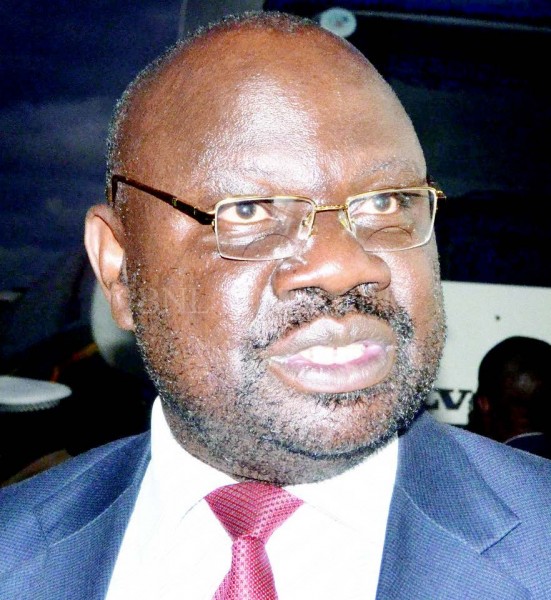 Botolo: Oil exploration to start within two months[/caption]
Principal Secretary in the Ministry Ben Botolo told Nyasa Times on Sunday after demands from some concerned residents of Karonga that government should release the full sensor gravity gradiometer on oil and gas exploration on Lake Malawi.
Botolo, who blamed former government of People’s Party (PP) on some “irregularities” regarding the deal, said there was no need to panic.
“The previous government messed up the whole process by signing the development and production agreements before the exploration results, a development which was questionable hence the delays,” said Botolo.
He mentioned that government had heard the cries of the people of and that it would disclose the findings on the exploration soon, adding government has never been silent on the matter.
“We will soon meet with the oil companies that were given the licenses so that they begin their processes,” he added.
Meanwhile, Malawi has assured the United Nations (UN) of her commitment to heritage conservation issues.
In a letter to the United Nations Scientific, Education and Cultural Organisation (Unesco) signed by Ministry of Sports and Culture Principal Secretary (PS) Sam Madula, said the issue of oil exploration started under a different government before the new government came in May 2014.
“Owing to complexity of the issue at hand, the new government needs time to assess the issue and the consequences of its decision,” reads the letter.
Environmental activist Godfrey Mfiti asked Malawi to withdraw its interest to explore oil at Lake Malawi National Park, a world heritage site.
“It is unfortunate that oil drilling in Lake Malawi is undermining the possible permanent environmental and public health impacts,” said Mfiti.
But another activist, Undule Mwakasungula, urged caution on the matter, saying government “must weigh the benefits from oil and keeping the so called recognised heritage.”
Four companies—Rak Gas, the Surestream-Hamra Oil Holdings venture, Pacific Oil and SacOil—hold the exploration licences.
Rak Gas—owned by the Government of Ras Al Khaimah, one of the emirates of the United Arab Emirates (UAE)—holds Blocks Four and Five it won after an international bidding participation. It has since carried out Full Tensor Gravity Gradiometry (FTG).
Hamra—a Cayman Island origin private company—bought 51 percent into Blocks Two and Three from Surestream and entered into a deed of assignment that was duly approved and signed by the ministry. Hamra too has carried out an FTG.
Pacific Oil, which is part of Vega Petroleum Limited—the privately owned oil and gas entity that has oil producing and exploration concessions in Egypt—secured Block Six, also after an international bidding participation while SacOil won Block One.
Both Pacific and SacOil are yet to carry FTGs, but the Vega group member has indicated that it is ready to carry out the exercise once it gets government nod.
Meanwhile, Karonga-based Oil and Gas Forum has blasted CSOs for spreading false reports about the oil exploration project, arguing the former simply want to confuse people and swallow donor money.
The group’s spokesperson Steve Simusokwe said they will not allow CSOs and NGOs to represent them again, saying they had frustrated them on the now closed Kayerekela Uranium Mine.
“We’ve been deceived a lot by them,” he said, “We will not let them advocate on our behalf anymore.”
According to Simusokwe, they have already, on their own, started sensitizing the community about oil and gas exploration on the lake, playing the bridging role between the community, government and mine companies as well as negotiating with the oil companies on social corporate responsibilities.
They believe oil discovery would be of economic benefit to their communities.
Botolo: Oil exploration to start within two months[/caption]
Principal Secretary in the Ministry Ben Botolo told Nyasa Times on Sunday after demands from some concerned residents of Karonga that government should release the full sensor gravity gradiometer on oil and gas exploration on Lake Malawi.
Botolo, who blamed former government of People’s Party (PP) on some “irregularities” regarding the deal, said there was no need to panic.
“The previous government messed up the whole process by signing the development and production agreements before the exploration results, a development which was questionable hence the delays,” said Botolo.
He mentioned that government had heard the cries of the people of and that it would disclose the findings on the exploration soon, adding government has never been silent on the matter.
“We will soon meet with the oil companies that were given the licenses so that they begin their processes,” he added.
Meanwhile, Malawi has assured the United Nations (UN) of her commitment to heritage conservation issues.
In a letter to the United Nations Scientific, Education and Cultural Organisation (Unesco) signed by Ministry of Sports and Culture Principal Secretary (PS) Sam Madula, said the issue of oil exploration started under a different government before the new government came in May 2014.
“Owing to complexity of the issue at hand, the new government needs time to assess the issue and the consequences of its decision,” reads the letter.
Environmental activist Godfrey Mfiti asked Malawi to withdraw its interest to explore oil at Lake Malawi National Park, a world heritage site.
“It is unfortunate that oil drilling in Lake Malawi is undermining the possible permanent environmental and public health impacts,” said Mfiti.
But another activist, Undule Mwakasungula, urged caution on the matter, saying government “must weigh the benefits from oil and keeping the so called recognised heritage.”
Four companies—Rak Gas, the Surestream-Hamra Oil Holdings venture, Pacific Oil and SacOil—hold the exploration licences.
Rak Gas—owned by the Government of Ras Al Khaimah, one of the emirates of the United Arab Emirates (UAE)—holds Blocks Four and Five it won after an international bidding participation. It has since carried out Full Tensor Gravity Gradiometry (FTG).
Hamra—a Cayman Island origin private company—bought 51 percent into Blocks Two and Three from Surestream and entered into a deed of assignment that was duly approved and signed by the ministry. Hamra too has carried out an FTG.
Pacific Oil, which is part of Vega Petroleum Limited—the privately owned oil and gas entity that has oil producing and exploration concessions in Egypt—secured Block Six, also after an international bidding participation while SacOil won Block One.
Both Pacific and SacOil are yet to carry FTGs, but the Vega group member has indicated that it is ready to carry out the exercise once it gets government nod.
Meanwhile, Karonga-based Oil and Gas Forum has blasted CSOs for spreading false reports about the oil exploration project, arguing the former simply want to confuse people and swallow donor money.
The group’s spokesperson Steve Simusokwe said they will not allow CSOs and NGOs to represent them again, saying they had frustrated them on the now closed Kayerekela Uranium Mine.
“We’ve been deceived a lot by them,” he said, “We will not let them advocate on our behalf anymore.”
According to Simusokwe, they have already, on their own, started sensitizing the community about oil and gas exploration on the lake, playing the bridging role between the community, government and mine companies as well as negotiating with the oil companies on social corporate responsibilities.
They believe oil discovery would be of economic benefit to their communities.